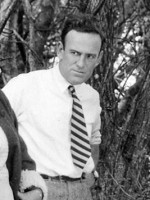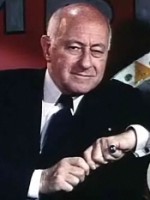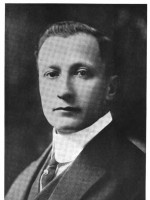Gloria Swanson is a Actor, Director and Producer American born on 27 march 1899 at Chicago (USA)

Gloria May Josephine Swanson (/ˈswɑːnsən/; March 27, 1899 – April 4, 1983) was an American actress, singer, and producer perhaps best known for her role as Norma Desmond, a reclusive silent film star, in the critically acclaimed 1950 film, Sunset Boulevard. She was one of the most prominent stars during the silent film era as both an actress and a fashion icon, especially under the direction of Cecil B. DeMille. She starred in dozens of silent films and was nominated for the first Academy Award in the Best Actress category. She also produced her own films, including Sadie Thompson and The Love of Sunya. In 1929, Swanson transitioned to talkies with The Trespasser. Personal problems and changing tastes saw her popularity wane during the 1930s when she moved into theater and television.
In early 1980, Swanson's 520-page autobiography, Swanson on Swanson, was published by Random House and became a national best-seller. It was translated into French, Italian and Swedish editions. That same year, she also designed a stamp cachet for the United Nations Postal Administration.
Religion
Swanson was a long-time member of the Lutheran church; her father was of Swedish Lutheran descent. In 1964, Swanson spoke at a "Project Prayer" rally attended by 2,500 at the Shrine Auditorium in Los Angeles. The gathering, which was hosted by Anthony Eisley, a star of ABC's Hawaiian Eye series, sought to flood the United States Congress with letters in support of school prayer, following two decisions in 1962 and 1963 of the United States Supreme Court, which struck down the practice as in conflict with the Establishment Clause of the First Amendment to the United States Constitution. Joining Swanson and Eisley at the Project Prayer rally were Walter Brennan, Lloyd Nolan, Rhonda Fleming, Pat Boone, and Dale Evans. Swanson declared, "Under God we became the freest, strongest, wealthiest nation on earth, should we change that?"
Marriages and relationships
Throughout her life and her many marriages, Swanson was always known as Miss Swanson. Though she legally took the names of her husbands, her own personality and fame always overshadowed them. Her first husband was the actor Wallace Beery, whom she married on her 17th birthday. In her autobiography Swanson on Swanson, Swanson wrote that Beery raped her on their wedding night. He also impregnated her in 1917. Not wanting her to have the child, he reportedly tricked her into drinking a concoction that induced an abortion and although they still worked together at Sennett, they separated and finally divorced two years later.
She married Herbert K. Somborn (1881–1934), then president of Equity Pictures Corporation and later the owner of the Brown Derby restaurant, in 1919. Their daughter, Gloria Swanson Somborn (October 7, 1920 – December 28, 2000), was born in 1920. Their divorce, finalized in January 1925, was sensational and led to Swanson having a "morals clause" added to her studio contract. Somborn accused her of adultery with thirteen men including Cecil B. DeMille, Rudolph Valentino, and Marshall Neilan. During their divorce Swanson wanted another child and in 1923 she adopted a baby boy, Sonny Smith (1922–1975), whom she renamed Joseph Patrick Swanson.
Swanson's third husband was the French aristocrat Henri, Marquis de la Falaise de la Coudraye, whom she married on January 28, 1925 after the Somborn divorce was finalized. Though Henri was a Marquis and the grandson of Richard and Martha Lucy Hennessy from the famous Hennessy Cognac family, he was not rich and had to work for a living. He was originally hired to be her assistant and interpreter in France while she was filming Madame Sans-Gêne (1925). Swanson was the first film star to marry European nobility, and the marriage became a global sensation. She conceived a child with him, but had an abortion, which, in her autobiography, she said she regretted.
Later, Henri became a film executive representing Pathé (USA) in France through Joseph P. Kennedy, Sr., who was running the studio. Many now assume he was given the position, which kept him in France for ten months a year, to simply keep him out of the way. This marriage ended in divorce in 1930 Soon after, Henri remarried, to actress Constance Bennett.
While still married to Henri, Swanson had an affair with the married Joseph P. Kennedy for a number of years. He became her business partner and their relationship was an open secret in Hollywood. He took over all of her personal and business affairs and was supposed to make her millions. Unfortunately, Kennedy left her after the disastrous Queen Kelly and her finances were in worse shape than when he came into her life. Two books have been written about the affair.
After the marriage to Henri and her affair with Kennedy were over, Swanson married Michael Farmer (1902–1975) in August 1931. Because of the possibility that Swanson's divorce from La Falaise had not been final at the time of the wedding, she was forced to remarry Farmer the following November, by which time she was four months pregnant with Michelle Bridget Farmer, who was born on April 5, 1932. Swanson and Farmer divorced in 1934, after she became involved with married British actor Herbert Marshall. The media reported widely on her affair with Marshall. After almost three years with the actor, Swanson left him once she realized he would never divorce his wife, Edna Best, for her. In an early manuscript of her autobiography written in her own hand decades later, Swanson recalled: "I was never so convincingly and thoroughly loved as I was by Herbert Marshall."
In 1945, Swanson married William N. Davey and according to her after discovering Davey in a drunken stupor, she and daughter Michelle, believing they were being helpful, left a trail of Alcoholics Anonymous literature around the apartment. Davey quickly packed up and left. Swanson-Davey divorce was finalized in 1946. For the next thirty years Swanson would remain unmarried and able to pursue her own interests.
Swanson's final marriage occurred in 1976 and lasted until her death. Her sixth husband and widower, writer William Dufty (1916–2002), was the co-author of Billie Holiday's autobiography Lady Sings the Blues, the author of Sugar Blues, a 1975 best-selling health book still in print, and the author of the English version of Georges Ohsawa's You Are All Sanpaku.
Dufty was a book ghost-writer and newspaperman, working for many years at the New York Post, where he was assistant to the editor from 1951 to 1960. He first met Swanson in 1965 and by 1967 the two were living together as a couple. Swanson shared her husband's deep enthusiasm for macrobiotic diets and they traveled widely together to speak about sugar and food. They promoted his book Sugar Blues together in 1975 and also wrote a syndicated column together. It was through Sugar Blues that Dufty and Swanson first got to know John Lennon and Yoko Ono. Swanson testified on his behalf at his immigration hearing in New York which led to him becoming a permanent resident.
Dufty ghost-wrote Swanson's best-selling 1980 autobiography, Swanson on Swanson, based on her early, sometimes handwritten drafts and notes. She personally revised the manuscript several times. They were prominent socialites, having many homes and living in many places, including New York City, Rome, Portugal, and Palm Springs, California. After Swanson's death Dufty returned to his former home in Birmingham, Michigan. He died of cancer in 2002.
Political views
Swanson was a staunch Republican and supported the 1940 and 1944 campaigns for president of Wendell Willkie, and the 1964 presidential campaign of Barry Goldwater. In 1980, she chaired the New York chapter of Seniors for Reagan-Bush.
Source : Wikidata
Gloria Swanson

- Infos
- Photos
- Best films
- Family
- Characters
- Awards
Birth name Gloria Josephine May Swanson
Nationality USA
Birth 27 march 1899 at Chicago (USA)
Death 4 april 1983 (at 84 years) at New York City (USA)
Nationality USA
Birth 27 march 1899 at Chicago (USA)
Death 4 april 1983 (at 84 years) at New York City (USA)
Gloria May Josephine Swanson (/ˈswɑːnsən/; March 27, 1899 – April 4, 1983) was an American actress, singer, and producer perhaps best known for her role as Norma Desmond, a reclusive silent film star, in the critically acclaimed 1950 film, Sunset Boulevard. She was one of the most prominent stars during the silent film era as both an actress and a fashion icon, especially under the direction of Cecil B. DeMille. She starred in dozens of silent films and was nominated for the first Academy Award in the Best Actress category. She also produced her own films, including Sadie Thompson and The Love of Sunya. In 1929, Swanson transitioned to talkies with The Trespasser. Personal problems and changing tastes saw her popularity wane during the 1930s when she moved into theater and television.
Biography
Swanson became a vegetarian around 1928 and was an early health food advocate who was known for bringing her own meals to public functions in a paper bag. Swanson told actor Dirk Benedict about macrobiotic diets when he was battling prostate cancer at a very early age. He had refused conventional therapies and credited this kind of diet and healthy eating with his recovery. In 1975, Swanson traveled the United States and helped to promote the book Sugar Blues written by her husband, William Dufty.In early 1980, Swanson's 520-page autobiography, Swanson on Swanson, was published by Random House and became a national best-seller. It was translated into French, Italian and Swedish editions. That same year, she also designed a stamp cachet for the United Nations Postal Administration.
Religion
Swanson was a long-time member of the Lutheran church; her father was of Swedish Lutheran descent. In 1964, Swanson spoke at a "Project Prayer" rally attended by 2,500 at the Shrine Auditorium in Los Angeles. The gathering, which was hosted by Anthony Eisley, a star of ABC's Hawaiian Eye series, sought to flood the United States Congress with letters in support of school prayer, following two decisions in 1962 and 1963 of the United States Supreme Court, which struck down the practice as in conflict with the Establishment Clause of the First Amendment to the United States Constitution. Joining Swanson and Eisley at the Project Prayer rally were Walter Brennan, Lloyd Nolan, Rhonda Fleming, Pat Boone, and Dale Evans. Swanson declared, "Under God we became the freest, strongest, wealthiest nation on earth, should we change that?"
Marriages and relationships
Throughout her life and her many marriages, Swanson was always known as Miss Swanson. Though she legally took the names of her husbands, her own personality and fame always overshadowed them. Her first husband was the actor Wallace Beery, whom she married on her 17th birthday. In her autobiography Swanson on Swanson, Swanson wrote that Beery raped her on their wedding night. He also impregnated her in 1917. Not wanting her to have the child, he reportedly tricked her into drinking a concoction that induced an abortion and although they still worked together at Sennett, they separated and finally divorced two years later.
She married Herbert K. Somborn (1881–1934), then president of Equity Pictures Corporation and later the owner of the Brown Derby restaurant, in 1919. Their daughter, Gloria Swanson Somborn (October 7, 1920 – December 28, 2000), was born in 1920. Their divorce, finalized in January 1925, was sensational and led to Swanson having a "morals clause" added to her studio contract. Somborn accused her of adultery with thirteen men including Cecil B. DeMille, Rudolph Valentino, and Marshall Neilan. During their divorce Swanson wanted another child and in 1923 she adopted a baby boy, Sonny Smith (1922–1975), whom she renamed Joseph Patrick Swanson.
Swanson's third husband was the French aristocrat Henri, Marquis de la Falaise de la Coudraye, whom she married on January 28, 1925 after the Somborn divorce was finalized. Though Henri was a Marquis and the grandson of Richard and Martha Lucy Hennessy from the famous Hennessy Cognac family, he was not rich and had to work for a living. He was originally hired to be her assistant and interpreter in France while she was filming Madame Sans-Gêne (1925). Swanson was the first film star to marry European nobility, and the marriage became a global sensation. She conceived a child with him, but had an abortion, which, in her autobiography, she said she regretted.
Later, Henri became a film executive representing Pathé (USA) in France through Joseph P. Kennedy, Sr., who was running the studio. Many now assume he was given the position, which kept him in France for ten months a year, to simply keep him out of the way. This marriage ended in divorce in 1930 Soon after, Henri remarried, to actress Constance Bennett.
While still married to Henri, Swanson had an affair with the married Joseph P. Kennedy for a number of years. He became her business partner and their relationship was an open secret in Hollywood. He took over all of her personal and business affairs and was supposed to make her millions. Unfortunately, Kennedy left her after the disastrous Queen Kelly and her finances were in worse shape than when he came into her life. Two books have been written about the affair.
After the marriage to Henri and her affair with Kennedy were over, Swanson married Michael Farmer (1902–1975) in August 1931. Because of the possibility that Swanson's divorce from La Falaise had not been final at the time of the wedding, she was forced to remarry Farmer the following November, by which time she was four months pregnant with Michelle Bridget Farmer, who was born on April 5, 1932. Swanson and Farmer divorced in 1934, after she became involved with married British actor Herbert Marshall. The media reported widely on her affair with Marshall. After almost three years with the actor, Swanson left him once she realized he would never divorce his wife, Edna Best, for her. In an early manuscript of her autobiography written in her own hand decades later, Swanson recalled: "I was never so convincingly and thoroughly loved as I was by Herbert Marshall."
In 1945, Swanson married William N. Davey and according to her after discovering Davey in a drunken stupor, she and daughter Michelle, believing they were being helpful, left a trail of Alcoholics Anonymous literature around the apartment. Davey quickly packed up and left. Swanson-Davey divorce was finalized in 1946. For the next thirty years Swanson would remain unmarried and able to pursue her own interests.
Swanson's final marriage occurred in 1976 and lasted until her death. Her sixth husband and widower, writer William Dufty (1916–2002), was the co-author of Billie Holiday's autobiography Lady Sings the Blues, the author of Sugar Blues, a 1975 best-selling health book still in print, and the author of the English version of Georges Ohsawa's You Are All Sanpaku.
Dufty was a book ghost-writer and newspaperman, working for many years at the New York Post, where he was assistant to the editor from 1951 to 1960. He first met Swanson in 1965 and by 1967 the two were living together as a couple. Swanson shared her husband's deep enthusiasm for macrobiotic diets and they traveled widely together to speak about sugar and food. They promoted his book Sugar Blues together in 1975 and also wrote a syndicated column together. It was through Sugar Blues that Dufty and Swanson first got to know John Lennon and Yoko Ono. Swanson testified on his behalf at his immigration hearing in New York which led to him becoming a permanent resident.
Dufty ghost-wrote Swanson's best-selling 1980 autobiography, Swanson on Swanson, based on her early, sometimes handwritten drafts and notes. She personally revised the manuscript several times. They were prominent socialites, having many homes and living in many places, including New York City, Rome, Portugal, and Palm Springs, California. After Swanson's death Dufty returned to his former home in Birmingham, Michigan. He died of cancer in 2002.
Political views
Swanson was a staunch Republican and supported the 1940 and 1944 campaigns for president of Wendell Willkie, and the 1964 presidential campaign of Barry Goldwater. In 1980, she chaired the New York chapter of Seniors for Reagan-Bush.
Best films
Usually with
Filmography of Gloria Swanson (74 films)
Actress

Airport 1975 (1974)
, 1h46Directed by Jack Smight
Origin USA
Genres Drama, Thriller, Action, Adventure
Themes La fin du monde, Transport films, Aviation films, Dans un avion, Disaster films, American disaster films, Films about aviation accidents or incidents
Actors Charlton Heston, Karen Black, George Kennedy, Efrem Zimbalist II, Susan Clark, Gloria Swanson
Roles Gloria Swanson
Rating57%





Columbia Air Lines' Flight 409 is a Boeing 747-100 on a red-eye route from Washington Dulles International Airport to Los Angeles International Airport. Scott Freeman, meanwhile, is a New Mexican businessman flying his private Beechcraft Baron to an urgent sales meeting in Boise, Idaho. However, an occluded front has the entire West Coast socked in, with Los Angeles reporting zero visibility. Columbia 409 and Freeman's Beechcraft are both diverted to Salt Lake City International Airport.

Killer Bees (1974)
, 1h14Directed by Curtis Harrington
Origin USA
Genres Science fiction, Horror
Themes Films about animals, Films about insects
Actors Gloria Swanson, Kate Jackson, Edward Albert, Craig Stevens, John Getz, Roger Davis
Roles Madame Maria von Bohlen
Rating48%





Madame von Bohlen, a strong-willed woman and matriarch of her family, not only runs her family wine business, but she also has a mysterious power; she has psychic control over a swarm of "killer bees" that reside in her vineyard.

Nero's Mistress (1956)
, 1h28Directed by Lucio Fulci, Steno
Origin France
Genres Comedy, Historical, Peplum
Themes Films set in Africa
Actors Alberto Sordi, Vittorio De Sica, Gloria Swanson, Brigitte Bardot, Ciccio Barbi, Arturo Bragaglia
Roles Agrippina
Rating55%





The young emperor Nero proves himself spoiled, childish and unable to cope with the government of Rome. The domineering mother Agrippina and the wise philosopher Seneca try to make change the personality of the emperor, but nothing can makes Nero is a wise and honorable regent. Agrippina then take advantage of a poetic and theatrical failure of Nero to kill him and take over the government of Rome. Seneca initially supported the woman, but then a double game and Nero warns about the conspiracy. Agrippina, smart, lays the blame on the Christians and of Seneca, who could be sentenced to death. However Nero easily deceived again and proved magnanimous, forgiving all.

Three for Bedroom C (1952)
, 1h14Directed by Milton H. Bren
Origin USA
Genres Comedy
Actors Gloria Swanson, Fred Clark, Hans Conried, Margaret Dumont, Steve Brodie, Dick Elliott
Roles Ann Haven
Rating58%





Ann Haven (Swanson), an aging movie actress, receives an urgent wire demanding that she immediately return to Hollywood to star in a new film.

Sunset Boulevard (1950)
, 1h50Directed by Billy Wilder, Charles C. Coleman, Gerd Oswald
Origin USA
Genres Drama, Comedy-drama, Noir, Romance
Themes Films about films, Films about writers, Medical-themed films, Psychologie, Films about television, Mise en scène d'un scénariste, Films about psychiatry
Actors William Holden, Gloria Swanson, Erich von Stroheim, Nancy Olson, Robert Emmett O'Connor, Fred Clark
Roles Norma Desmond
Rating83%





At a Sunset Boulevard mansion, the body of Joe Gillis floats in the swimming pool. In a flashback, Joe relates the events leading to his death.
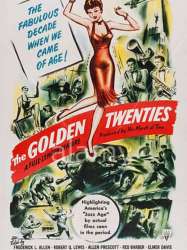
The Golden Twenties (1950)
, 1h8Origin USA
Genres Documentary
Actors Charlie Chaplin, Rudolph Valentino, Robert Q. Lewis, John Barrymore, Vilma Bánky, Irving Berlin
Roles Self (archive footage)
Rating65%






Father Takes a Wife (1941)
, 1h19Origin USA
Genres Comedy, Romance
Actors Adolphe Menjou, Gloria Swanson, John Howard, Desi Arnaz, Helen Broderick, Florence Rice
Roles Leslie Collier Osborne
Rating60%





Senior (Adolphe Menjou) is as a middle-aged widowed shipping magnate, who falls in love with celebrated actress Leslie Collier (Gloria Swanson) and marries her after a whirlwind courtship.

Music in the Air (1934)
, 1h25Directed by Joe May
Origin USA
Genres Comedy, Musical theatre, Romantic comedy, Musical, Romance
Themes Films about music and musicians, Théâtre, Musical films, Films based on plays, Films based on musicals, Operetta films
Actors Gloria Swanson, June Lang, John Boles, Douglass Montgomery, Joseph Cawthorn, Al Shearer
Roles Frieda Hotzfelt
Rating59%





Opera star Frieda Hotzfelt (Gloria Swanson) spars with librettist Bruno Mahler (John Boles). Aspiring songwriter Karl Roder (Douglass Montgomery) stumbles into their stormy relationship.
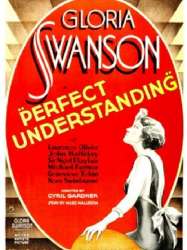
Perfect Understanding (1933)
, 1h20Directed by Cyril Gardner
Origin United-kingdom
Genres Drama, Comedy, Comedy-drama, Romantic comedy, Romance
Themes La provence
Actors Gloria Swanson, Laurence Olivier, John Halliday, Genevieve Tobin, Nora Swinburne, Charles Cullum
Roles Judy Rogers
Rating56%





Judy (Swanson) and Nicholas Randall (Olivier) are a newly married couple who agree to a marriage based on "perfect understanding." This agreement is meant to rule out any form of jealousy. During their honeymoon they are called away to Cannes to spend time with their friends. Judy chooses to go back to London to decorate their home but insists that Nicholas spend time with their friends. While in Cannes, Nicholas becomes drunk and ends up sleeping with Stephanie (Swinburne), his former mistress. Nicholas is guilt-stricken and immediately returns home and confesses to Judy his sin. Judy forgives him due to their prior agreement of a perfect understanding. However, while Nicholas is away on business she confesses to her friend Ivan (Halliday) that she is still upset with Nicholas. Ivan then declare his love for Judy and tells her that if she would like, he would be willing to spend the night with her. Judy leaves Ivan to consider her options and ends up wandering the streets at night. Meanwhile, Nicholas has been outside Ivan's apartment and does not realize that Judy has left. He concludes that the two are having an affair. When Judy returns from walking the streets she leaves a letter for Ivan, thanking him for his love.

Queen Kelly (1932)
, 1h15Directed by Richard Boleslawski, Erich von Stroheim, Gloria Swanson, Irving Thalberg, Sam Wood, Edmund Goulding
Origin USA
Genres Drama, Romance
Themes Monde imaginaire, Films about religion
Actors Gloria Swanson, Walter Byron, Seena Owen, Walter Byron, Tully Marshall, Sylvia Ashton
Roles Kitty Kelly / Queen Kelly
Rating70%





Prince Wolfram (Byron) is the betrothed of mad Queen Regina V of Kronberg (Owen). As punishment for partying with other women, he is sent on manoeuvres. He sees Kitty Kelly (Swanson) walking with other convent students and flirts with her. She is embarrassed when he makes a comment after seeing that her underwear is visible, so she takes it off and throws it at him, to the horror of the nuns, who punish her for her "indecency".
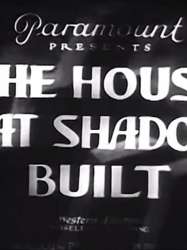
The House That Shadows Built (1931)
, 55minutesOrigin USA
Genres Documentary
Actors Gloria Swanson, Kay Francis, Zeppo Marx, Gary Cooper, Harpo Marx, Noah Beery Sr.
Roles (archive footage)
Rating67%






Indiscreet (1931)
Directed by Leo McCarey
Origin USA
Genres Drama, Comedy, Musical theatre, Musical, Romance
Themes Musical films
Actors Gloria Swanson, Ben Lyon, Monroe Owsley, Barbara Kent, Arthur Lake, Maude Eburne
Roles Geraldine 'Gerry' Trent
Rating61%





The plot of the United Artists release centers on fashion designer Geraldine Trent (Swanson), who takes up with novelist Tony Blake (Lyon) after leaving her former beau Jim Woodward because of his many indiscretions with other women. Tony has indicated he has no interest in dating a woman with a past, so Geraldine remains mum about her affair with Jim, until her younger sister Joan arrives and announces she's engaged—to Jim. Madcap complications ensue as Geraldine tries to keep her secret from Tony while convincing her sister to rid herself of her womanizing fiancé in favor of simple country boy Buster Collins.

Tonight or Never (1931)
, 1h20Directed by Mervyn LeRoy
Origin USA
Genres Comedy, Romantic comedy, Romance
Themes Théâtre, Films based on plays
Actors Gloria Swanson, Constance Cummings, Melvyn Douglas, Alison Skipworth, Ferdinand Gottschalk, Robert Greig
Roles Nella Vago
Rating65%





Nella Vargo (Swanson) is a Hungarian prima donna whose latest performances include singing Tosca in Venice. Although she is praised by the audience, her music teacher Rudig feels that she can not be the greatest opera singer in history until she performs in New York City. When she is criticized for not putting her soul into the song, she gets mad, until she suddenly notices a mysterious man walking on the street. She becomes smitten with the man, until Rudig claims that he is a gigolo whose latest client is Marchesa Bianca San Giovanni, a former diva with a notorious past.

What a Widow! (1930)
, 1h28Directed by Allan Dwan, Dudley Murphy
Origin USA
Genres Comedy, Romantic comedy, Romance
Actors Owen Moore, Gloria Swanson, Lew Cody, Margaret Livingston, Gregory Gaye, William Holden
Roles Tamarind Brook
Rating59%





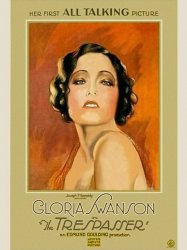
The Trespasser (1929)
, 1h30Directed by Edmund Goulding
Origin USA
Genres Drama
Actors Gloria Swanson, Robert Downing Ames, Purnell Pratt, Henry B. Walthall, Stuart Erwin, Wally Albright
Roles Marion Donnell
Rating64%





A humble woman (Swanson) marries a wealthy man (Ames). Their marriage is annulled by the man's father (Holden), who considers her a fortune-hunter, and she is left alone to raise her child. She later becomes a "kept woman" for an older, married man. When the man dies, leaving Swanson a $500,000 inheritance, the press is quick to cast doubts upon the paternity of Swanson's child. Her ex-husband has since remarried, and now comes back into Swanson's life. For the sake of her child, she sends the boy to live with her ex and his wife. The wife dies and the film ends happily (if improbably) with Swanson reunited with her ex-husband.
 Connection
Connection


